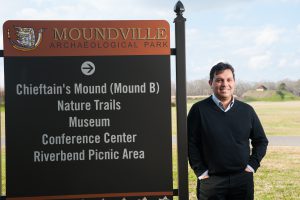
TUSCALOOSA, Ala. — Dr. Alexander Benitez was instantly drawn to The University of Alabama’s Moundville Archaeological Park for many reasons, one of which was the connection between park staff and the many Native American communities who still regularly visit the area.
“Moundville is one of the most important Native American cultural heritage sites in the Southeastern U.S.,” said the park’s new director. “At its apex during the 13th century AD, it was one of the largest and most influential centers of Mississippian culture.
“In fact, it is estimated to be one of the largest settlements in North America during that time. Just as important to me was the fact that Moundville remains an important ancestral place for descendant Native American communities.”
Benitez, who took on the role of Moundville Archaeological Park’s director Feb. 1, holds a master’s and doctorate in anthropology from the University of Texas-Austin and a bachelor’s from the University of Arizona.
Over the past 25 years he has worked at several state and federal museums and collections facilities in a variety of positions, and he has served on the faculty at George Mason University.
Benitez’s anthropology work has included exhibition research, collections care, public and educational programming, co-curating a major Smithsonian Institution exhibition and directing two multi-year collections research projects at the National Museum of the American Indian.
It is this diverse work experience that Benitez says has prepared him for the vast responsibilities of the Moundville Archaeological Park Director position.

“Alex Benitez is a respected museum anthropologist, with experience on major projects at the Smithsonian,” said William Bomar, executive director of University Museums.
“He recognizes the great international significance of the Moundville site and is excited about continuing the progress that has been made in raising public awareness about this incredible place, and getting more people to experience it firsthand.”
Benitez understands there will be challenges, particularly prioritizing what needs to be done and ensuring there are resources to accomplish those goals. But he also can’t imagine a more beautiful place to work.
“The site of Moundville itself is awe-inspiring,” he said. “I am impressed at how well the site has been preserved over the many decades that it has been open to the public. The tranquility of the mounds today, however, contradicts the great energy and activity that once occurred at the site daily, on the top of the mounds and in the large plaza areas.
“The Jones Archaeological Museum fills in that part of the Moundville story. The museum does a fantastic job bringing aspects of Mississippian society to life. … I doubt that there has been a single visitor who regretted the drive from Tuscaloosa or elsewhere to Moundville to experience what the park has to offer. It is truly a unique and beautiful place.”
Contact
Kim Eaton, UA media relations, 205/348-8325, kkeaton@ur.ua.edu
